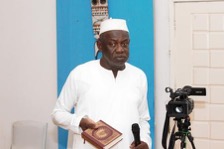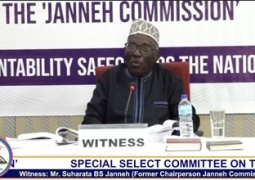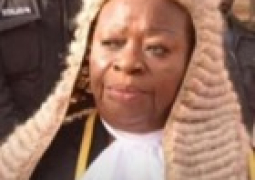
It was registered in 2003 as a sole proprietorship business. He said his company had bulldozers and graders. Kinteh was summoned by the Commission to discuss the payment he received from the Kanifing Municipal Council (KMC). The Council transferred D1.6 million to him.
Kinteh testified: “I did not work for them directly. Kanjura Kanyi [dumpsite supervisor] came to me and told me that they were looking for mechanics who would service their bulldozers. I told him I know someone in Senegal.”
He added he has never been to the KMC for this payment or for any contract. Instead, he was only there to help them. He asked what he meant by “helping the KMC”. He stated that the KMC was reluctant to pay cash to the mechanic, and they needed him to help facilitate the payment.
“I only helped them,” he restated.
He said he was on sickbed at the time of receiving the payment, further explaining that it was Kanjura Kanyi who “was going to KMC and coming to him regarding the transactions”.
“Does your business offer vehicle maintenance?” Lead Counsel Patrick Gomez asked, receiving a positive response.
Lead Counsel Gomez asked him to provide evidence of past company works in which they provided mechanical services, but Kinteh said said he lost most of his documents. He added that as a construction company, he builds roads and others. He stated that he uses heavy machines in his work.
He provided his GPPA registration certificate of 2017 for construction. He claimed that he had other documents, but he could not trace them because he had been sick since 2018. He testified that he went for treatment abroad. The GPPA registration certificate was admitted in evidence.
On the payment, he said the KMC paid the money in his account and when the time was due for the Dakar trip, he was sick and underwent an operation. He said he gave some cheques to Mustapha Kanyi also known as Kanjura Kanyi. After this, he explained, he was taken to Senegal for treatment, where he spent four months.
“When I came back, I did not know anything about the machines,” he said.
Kinteh testified that Kanyi was the one who came to tell him about it and took his invoice and receipts. Nevertheless, he admitted that he had never signed a contract for repairing heavy equipment. “I came in just to assist,” he maintained.
He was asked about the genuineness of the invoice. He explained he was there to help because KMC said they would only pay to a company, and they would not pay over the counter. He testified that he allowed his invoice and account to be used in the transaction, but, as put by the lead counsel, his company (Nkolan) was not doing any business with KMC.
“Your actions were not proper. You were sick and you gave money to Mr Kanyi. You should have returned to the KMC,” the lead counsel said. Kinteh agreed “the fact” but only did it in good faith.
However, he could not confirm if Kanyi purchased the spare parts or not.
Read Other Articles In Headlines





